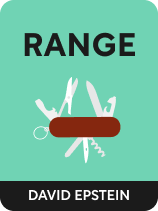

This article is an excerpt from the Shortform book guide to "Range" by David J. Epstein. Shortform has the world's best summaries and analyses of books you should be reading.
Like this article? Sign up for a free trial here .
Why is it better to have a wide range of skills rather than focusing on one specialty? What is the three-stage formula for becoming a generalist?
According to David Epstein’s book Range, generalists do better in life than specialists. Given the unpredictable nature of the world and the fact that many specialized jobs are being replaced by technology, focusing on one specialty your whole life will be detrimental to your success.
Keep reading to learn about the benefits of being a generalist and how to be one.
The Generalist’s Path to Excellence
You’ve seen why the traditional path to excellence—early specialization—is misguided and outdated. Luckily, Epstein has outlined a new path to excellence—a formula to help us thrive in the modern world.
Instead of picking one skill and trying to stick with it for your whole life, Epstein suggests in Range that generalists should:
- Explore and Experiment
- Specialize Inefficiently
- Be Prepared to Pivot
We’ll examine each of these life stages in turn.
Stage 1: Explore and Experiment
Epstein asserts that the first step to mastery is an era of exploration and experimentation with different activities—a “sampling period,” as he calls it. Musicians, entrepreneurs, and athletes alike benefit from a period of early exploration, for a couple of reasons.
First, Epstein establishes the principle that broad learning teaches transferable skills. Basic training in a wide range of activities teaches a unique kind of skillset—one founded on instincts and principles that apply across disciplines rather than habits that apply in only one context.
A study conducted at a high-level music boarding school found that the highest-performing students didn’t practice more than others, took fewer formal lessons, didn’t start playing at a younger age, and didn’t even come from musical families. Instead, what set them apart was the number of instruments they knew how to play. The most exceptional students typically spread their practice time across three instruments.
(Shortform note: Science shows that there are limits to how far skills can transfer. Psychologists first distinguished between “near transfer” and “far transfer” of learning in 1923. You can use your experience with one musical instrument to help learn another, but it doesn’t make you better at math. The former is near transfer while the latter is far transfer. Experience can transfer proportionally to the number of similar elements shared by two activities—near transfer is a valuable learning tool, but far transfer has been largely debunked. Despite arguments to the contrary, teaching kids chess or piano doesn’t somehow make them smarter in school.)
Second, a period of exploration increases your chances of discovering a pursuit that’s a good fit for you—something that suits your inherent talents and that you’re excited about pursuing.
Extending this idea, Epstein suggests that parents should nurture exploration in their children, allowing them to discover their own likes and dislikes. Eager parents try to get their kids to skip the era of exploration by choosing lifelong pursuits for them as early as possible—often a particular musical instrument or sport. However, an externally-imposed specialization is far less likely to be a good fit than one you choose for yourself. A study of 1,200 musicians showed that kids who had their destinies chosen for them were far more likely to quit later down the road.
| Exploring Employment: What Season Are You In? Before you start putting in the work to become a master at something, you need to explore long enough to find out what’s motivating you. If you skip the exploratory period and begin specializing in something you’re not personally driven to pursue, you won’t care enough to push through the difficulties required to succeed. Finding a job that’s a good fit for you requires identifying what you want to get from that job. Financial guru Ramit Sethi has organized the most common career motivations into three categories he calls “Career Seasons.” You’re in the season of “Growth” if you’re primarily motivated to jumpstart your career and rise as quickly as possible. You’re in “Lifestyle” if your primary goals lie outside your career, for example, spending more time with family. You’re in “Reinvention” if you feel unfulfilled on your current life path and want to start totally fresh on something new. Sethi calls these stages “Career Seasons” because over the course of your lifetime, your priorities will change, and you’re likely to cycle through these stages more than once. It’s important to be conscientious of your shifting priorities. If you feel you’ve outgrown your current job, it may be time to go exploring again. |
Stage 2: Specialize Inefficiently
After an era of exploration in which they’ve built up a broad base of experience and found an activity that’s a good fit for them, generalists do engage in specialized practice, but they do so differently than traditional specialists.
Epstein argues that, unlike the rigorous drills practiced by specialists—for example, a piano player practicing her scales—we shouldn’t optimize learning for efficiency, as the most effective learning is slow and difficult.
Epstein cites a study observing undergraduate-level calculus classes at the Air Force Academy. Over the course of a decade, researchers studied the performance of more than ten thousand students and a hundred different professors, who all taught the exact same curriculum. Some professors emphasized broad, interdisciplinary understanding, while others emphasized the efficient mastery of specific procedures that would be on the test.
The latter group of professors, who prioritized efficient memorization, yielded students with higher test scores and earned more positive student evaluations than the professors who emphasized general knowledge. However, once the students advanced to Calculus II and more complex math classes, students of deep learning vastly outperformed their procedurally-minded peers. Lasting, useful knowledge takes time to learn.
This holds true even for narrow skills like playing a musical instrument. Epstein finds that many jazz legends taught themselves how to play, without formal lessons, through an excruciatingly inefficient process of trial and error. By teaching themselves, these musicians not only mastered their instruments forward and backward, they discovered the unique skill of effortless improvisation, developing a creative instinct that classically trained musicians could never match. The slow struggle of experimentation provides its own unique, lasting skills in any pursuit.
| The Strengths and Weaknesses of “Overlearning” Countering Epstein’s argument that efficient specialists miss out on the depth of inefficient practice, recent research has identified the benefits of “overlearning”: practicing a skill after you’ve already achieved proficiency. If specialists can continue to train their existing skills indefinitely, the efficient path to mastery doesn’t seem to miss much. However, research shows that overlearning in narrowly specialized domains may limit these specialists in a different way. In one study on overlearning, two groups of subjects were trained to identify subtle striped patterns embedded in static on a screen. One group was assigned to overlearn, practicing for twenty minutes after both groups had already learned to pick out the correct pattern. The next day, the overlearners were able to complete their task far better than those who didn’t overlearn. However, when asked to perform a new task—identifying a slightly different pattern in the static—the overlearners actually performed worse than the control group. What does this tell us? The researchers concluded that the overlearners’ weakened performance was a side effect of their “resilient” experience with the first task. They had learned the first skill so well that they found it difficult to stray from the procedure. In other words, overlearning narrow skills hinders the application of those skills in new contexts. When specialists attempt to learn adjacent skills, like classical musicians attempting to improvise or Air Force Academy students advancing to Calculus II, their overlearning of narrow procedures may do more harm than good. |
Stage 3: Be Prepared to Pivot
Even after they’ve specialized enough to become a master in their field, generalists approach life differently than specialists. We live in a constantly changing world, and you need to be prepared to pivot—that is, to start chasing an entirely new specialization, if need be.
Often, we see pivoting as a sign of weakness, giving up on what we’ve promised to do—a deficiency of “grit.” Epstein disagrees, arguing that too much commitment can be just as harmful as not enough. He cites a Gallup survey showing that 85% of workers around the world are either “not engaged” at work or “actively disengaged.” This shows that many people are far too committed to the jobs they currently have and suffering for it.
Contrary to accepted wisdom, Epstein argues that it’s better to chase whatever opportunities you’re passionate about in the short term rather than committing to a single long-term goal or vision for your future. This is because people change, and it’s impossible for you to know how much you’ll change. A job that was a good fit for you ten years ago may not be anymore, and you’ll need to pivot. Additionally, it’s impossible to predict what opportunities will or won’t be available in the future, so planning your life out ahead of time and refusing to quit will unnecessarily limit your options.
| The Pitfalls of Passion In his book So Good They Can’t Ignore You, Cal Newport warns against making passion the primary guide of your career decisions. You shouldn’t be afraid to pivot if you’re stuck in a job you hate, but you shouldn’t expect your career to be transcendently fulfilling and refuse to specialize at all, either. In Newport’s eyes, it’s alright to start a career in something you’re not passionate about. The idea that everyone has a single life purpose that they need to discover in order to be happy is a myth. In fact, studies have found that most people aren’t passionate about their dream jobs until after they’ve been working there for several years. This is because the elements of motivation that get you excited to go to work in the morning are extremely different than most people expect. Psychologists have developed a framework called self-determination theory, identifying the primary contributors to motivation as autonomy, competence, and relatedness—that is, how much you feel you’re in control over your responsibilities, how skilled and capable you feel, and how connected you feel to those around you. None of these require a deeply emotional divine calling—you can acquire them as you work. |
Generalists Have More Creative Ideas
Epstein asserts that generalists are better at coming up with new ideas and solving problems in creative ways, making them far more valuable in the professional world than specialists.
Firstly, their diverse background experience makes it easier for them to think analogically—that is, using analogies to discover commonalities between dissimilar situations. For example, a start-up CEO struggling to decide whether to sell her rapidly growing company could inform her decision by studying 20th-century farmers who discovered massive wealths of oil underneath their land. Analogical thinking is effective because seemingly unrelated problems often have the same underlying structure, enabling similar solutions.
Secondly, generalists are better at lateral thinking, the use of pre-existing knowledge in a new context. Epstein writes extensively about cases in which outsiders with less expertise and less information about a given situation solve problems that have stumped teams of experts for years. They’re able to come up with ideas specialists never would because they’re drawing from a different background.
Lastly, the fact that creativity is all about bringing together ideas in new ways reveals the practical value of diversity in the workplace. Epstein notes that team members with diverse backgrounds bring together diverse ideas, making it more likely that they’ll come up with something new. For this reason, scientists who have worked abroad at some point in their lives, on average, make more impactful discoveries.
| Creativity Requires Inefficiency These three generalist strategies show that it’s impossible to efficiently specialize in creativity. Likewise, the management strategies that yield the most creative ideas are often the opposite of those required for efficient procedural work. Robert Sutton, the author of Weird Ideas That Work, concludes that the most innovative organizations are “inefficient (and often annoying) places to work.”Sutton offers another piece of counterintuitive advice: Managers of creative teams should reward employees for success and failure and only punish employees for inaction. Quantity, not quality, is the path to creative success. Here’s another: Companies that want innovation should hire employees that often refuse to listen to bosses or coworkers. The Xerox employee who invented the laser printer was someone like this. He was working at a research and development lab, an organization whose sole purpose is innovation, yet when he suggested they look into the blossoming new potential of laser technology, he was dismissed by his coworkers and ordered to stop looking into it by his boss. Fortunately, he complained to someone higher up, got transferred to a new lab, and revolutionized the printing industry. |

———End of Preview———
Like what you just read? Read the rest of the world's best book summary and analysis of David J. Epstein's "Range" at Shortform .
Here's what you'll find in our full Range summary :
- Why it's better to be proficient in a range of skills rather than becoming a specialist in one
- Why you're never “too late” to pursue something you’re interested in
- Why the nontraditional background of a generalist gives them an edge






